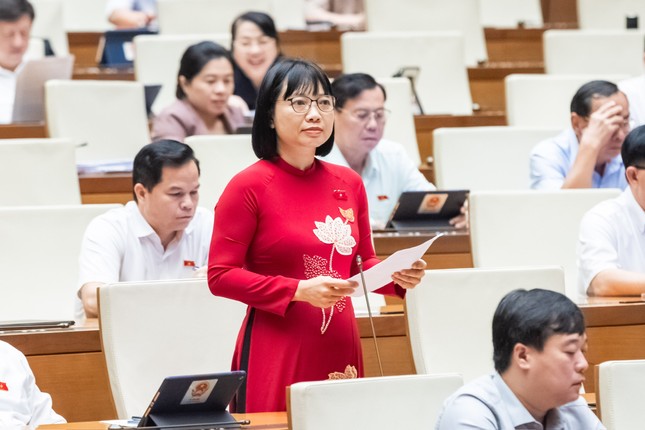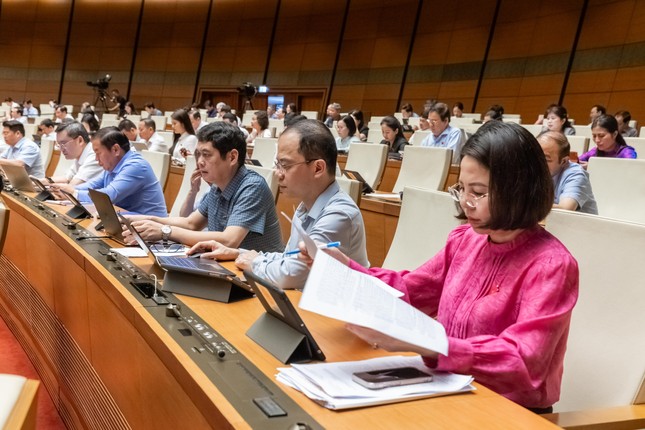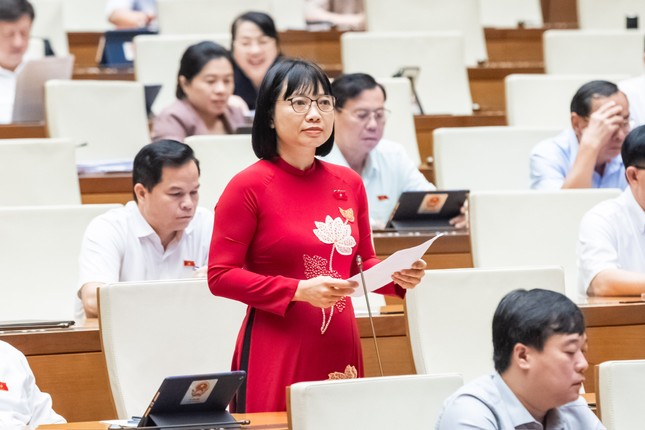Preventing “Shell Companies” from Exploiting Post-Inspection Mechanisms
On the morning of May 16, the National Assembly discussed the draft resolution on mechanisms and policies to develop the private economy.
Strongly agreeing on the necessity to issue the resolution, Deputy Nguyen Thi Viet Nga (Hai Duong delegation) believed that this is an important and timely step to institutionalize the consistent direction of the Party, especially in the documents of the 13th National Congress and recently in Resolution No. 68-NQ/TW of the Politburo.

Deputy Nguyen Thi Viet Nga (Hai Duong delegation). Photo: Nhu Y
Agreeing with the direction of shifting strongly from pre-inspection to post-inspection, Ms. Nga said that this direction is in line with international practices, helping to reduce compliance costs for enterprises, encouraging startups, creativity, and production expansion.
However, the female deputy of Hai Duong Province noted that without a strong, transparent, and effective post-inspection mechanism, this policy can easily become a loophole for “shell companies” to exploit.
In fact, many subjects have taken advantage of lax policies to set up hundreds of non-operating companies, buying and selling invoices, evading taxes, laundering money, causing budget losses, and distorting the competitive environment.
“There have been cases where authorities discovered more than 600 shell companies issuing over 1 million fake invoices, with a transaction value of up to VND 64 trillion,” said Deputy Nguyen Thi Viet Nga.
From there, the deputy suggested supplementing specific requirements for the post-inspection system in interconnecting data between tax, customs, and banking agencies; conducting on-site inspections; applying digital technology in monitoring; and having deterring penalties.
At the same time, it is necessary to stipulate the sectors and fields that must be pre-inspected, based on risks and international experience, to avoid indiscriminate or loose application.
Supporting Land and Interest Rate Policies
At the discussion session, Deputy Tran Hoang Ngan (Ho Chi Minh City delegation) stated that Resolution 68 of the Politburo on the private economy is of great significance, especially as the country is about to enter a new era of accelerated development.
The private sector accounts for a large proportion of the economy, determining 55% of total social investment. Therefore, we must have special mechanisms to support the private sector.

National Assembly deputies at the discussion session. Photo: Nhu Y
Regarding the policy to support access to land and production and business premises, he proposed supplementing regulations so that localities with land advantages must have mechanisms to establish and expand industrial parks. This will facilitate private enterprises and small and medium-sized enterprises to rent land at supportive and preferential prices.
In addition, the deputy of Ho Chi Minh City also proposed having financial and credit support policies for the private sector. Therefore, the resolution needs to include a clause on clean land funds and supportive interest rates for the private sector.
“It is necessary to clarify the mechanism of budget support and where it comes from. Commercial banks can disburse loans for businesses,” said Mr. Ngan.
Sharing the same concern, Deputy Tran Van Tuan (Bac Giang delegation) suggested that, along with the issuance of this resolution, it is necessary to promptly amend related laws, including some draft laws that have been included in the agenda of the 9th session, to support access to land and production and business premises.
Accordingly, there should be specific support regulations such as supporting investment in the construction of industrial park infrastructure, industrial cluster infrastructure, and incubators. “This regulation will help private enterprises have easier access to land and production and business premises – one of the big obstacles facing the private sector today,” said Mr. Tuan.
















